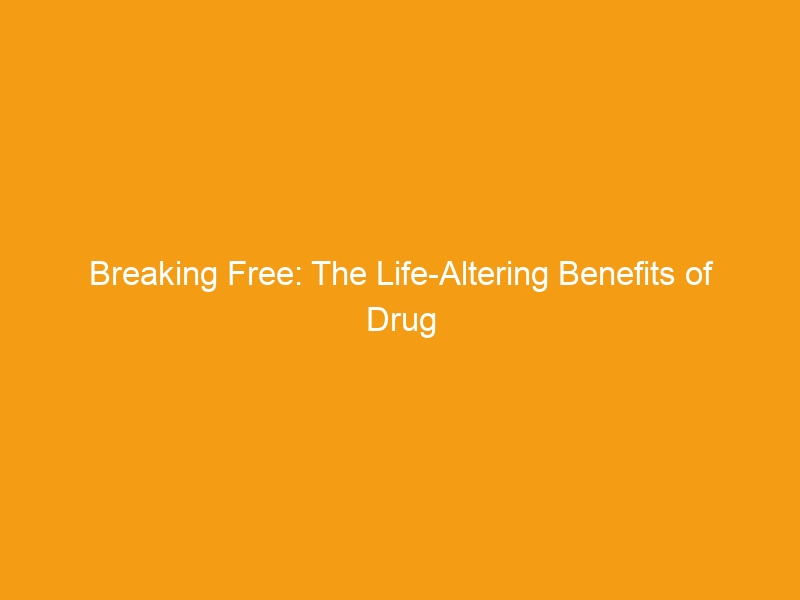The harrowing journey through addiction to drugs or alcohol is one fraught with hardships, both for the individual and their loved ones. Through understanding, treating, and overcoming dependency, drug rehabilitation offers a beacon of hope to those seeking change. The road to recovery is not an easy one, but the life-altering benefits of completing a drug rehab program cannot be understated. The path to sobriety provides significant improvements in physical health, mental clarity, emotional stability, and societal relationships, and opens doors to new beginnings. Below, we delve into how drug rehabilitation can transform lives and offer a fresh start.
Understanding the Grip of Addiction and the Need for Drug Rehabilitation
Drug addiction is a complex disease that overpowers the mind and body, entangling individuals in a web of dependency. It transcends the boundaries of willpower and morality, affecting neurochemical pathways and creating compulsive behaviors. Understanding that addiction is not a choice but a chronic disease is vital in recognizing the necessity for professional intervention and comprehensive drug rehabilitation programs.
Rehabilitation centers are essential in breaking the cycle of addiction. They provide a structured environment that allows individuals to detoxify safely while addressing the root causes of their addiction through therapy and counseling. Sustained recovery requires relentless commitment and support, underscoring the need for ongoing treatment and care beyond initial detoxification.
For many, seeking help is a significant first step towards recovery. Not only do they combat the physical dependencies, but they also learn vital coping skills. This includes strategies to resist drugs and alcohol in the future, manage triggers, and rebuild their lives. Here, rehab centers in Waco, TX test the transformative power of dedicated rehabilitation programs.
Mental Clarity and Emotional Stability: Psychosocial Benefits of Sobriety
Drug rehab offers more than just a cessation of drug use; it fosters mental healing and emotional growth. As substances leave the body, a fog lifts from the mind, making way for improved cognitive functions and decision-making. This clarity is vital for individuals to engage fully with the therapeutic components of a rehab program.
Beyond enhancing mental acuity, therapy sessions within rehab facilitate an understanding of emotional triggers and dysfunctional thought patterns that fuel addiction. Recovering addicts begin to develop healthier responses to stress and trauma, thereby promoting lasting sobriety. Emotional regulation becomes a powerful tool forged during rehab.
The journey is often cathartic, with many patients reporting feelings of relief as they face, for the first time, the underlying psychological factors contributing to their addiction. Through individual and group therapy, they confront and overcome past trauma, anger, guilt, and shame—a process essential for emotional healing and stability.
Renewed Relationships: The Social Advantages of Successful Drug Recovery
Substance dependency strains relationships, often pushing loved ones away. However, through successful drug rehab, individuals can mend and strengthen these bonds. Family therapy and counseling are integral to this process, addressing the hurt and facilitating communication to rebuild the trust that was damaged by addiction.
With sobriety, the addict’s presence in the lives of friends and family becomes more stable and reliable, offering a renewed sense of companionship and support. As relationships heal, recovering addicts often find a renewed sense of purpose, knowing their actions positively contribute to the lives of those they care about.
Moreover, social skills are often honed within a rehab center. Recovering individuals relearn how to interact without the crutch of substances, preparing them to re-enter society with confidence. This bolsters their ability to foster new relationships and to participate in community activities post-rehabilitation.
Opening New Doors: Career and Educational Opportunities Post-Rehabilitation
Emerging from drug rehabilitation, individuals often confront the damage their addiction inflicted on their professional and educational aspirations. Sobriety, however, unlocks the potential to pursue these goals once again. With a clear mind and a commitment to sobriety, rehab graduates can return to or start new paths in education and careers.
Many rehab programs incorporate vocational training and educational services, equipping individuals with skills and qualifications conducive to employment. Such resources are invaluable, empowering recovering addicts to become economically self-sufficient and reinforcing their sense of self-worth and purpose.
Altogether, the transformative journey through drug rehab stretches far beyond achieving sobriety. It heals bodies, mends hearts, rebuilds relationships, and opens doors to new personal and professional opportunities. Overall, drug rehabilitation is not just a process of recovery; it’s a rebirth, granting individuals the ability to lead a fulfilling life they once thought was beyond their reach.

